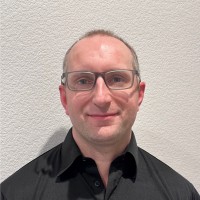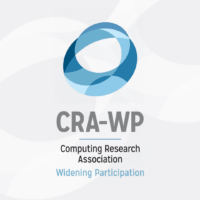Get To Know NSF CSGrad4US: Highlighting Current Fellows
By Elora Daniels, Communications Associate
Applications for the NSF CSGrad4US fellowship program are due May 31! In anticipation of the upcoming deadline, the Computing Research Association (CRA) is wrapping up our highlight series of some of the current Fellows participating in the program.
The NSF CSGrad4US Fellowship is open to anyone who has been out of school since January 2024. To help answer questions from the community and provide general insights into the program, the CSGrad4US team hosted an informational webinar to answer questions for those interested in applying this year.
Learn more and apply for the CSGrad4US Fellowship by May 31, 2024: https://cra.org/csgrad4us/
CSGrad4US fellows come from all walks of life. Get to know a few more of their incredible stories:
 Evan Frenklak, University of Texas at Austin
Evan Frenklak, University of Texas at Austin
Electrical and Computer Engineering — Computational/Medical Imaging
Evan is a first year PhD student and CSGrad4US fellow at UT Austin, working with Professor Jon Tamir in the Computational Sensing and Imaging Lab. Previously Evan worked in industry on radar R+D, including field projects with NASA to develop low-cost geophysical imaging platforms. His research interests include optimization models and signal reconstruction for accelerated MRI. A current project examines the impact of sampling patterns used in public MRI datasets on downstream analysis and algorithm training. Evan hopes to bridge ideas from applied math, computer science, and engineering to improve clinical outcomes and make medical imaging more accessible.
 Kate Glazko, University of Washington
Kate Glazko, University of Washington
Computer Science — HCI/Accessibility
Kate is a first-year PhD student at UW advised by Dr. Jennifer Mankoff. Kate’s current research centers around the opportunities that generative AI could present for making areas such as design and fabrication more accessible. She is likewise interested in solutions to the ableist and inaccessible outputs that GAI models can sometimes produce. Kate’s research interests also include more approachable, engaging ways of communicating information such as health feedback. Kate additionally collaborates with Dr. Elizabeth Murnane (Dartmouth) Dr. James Landay (Stanford), Dr. Paula Moya (Stanford) on the WhoIsZuki and Perfecto projects which study novel methods of encouraging exercise in at-risk individuals. Previously, Kate did her MS and BS in CS at the University of Southern California where she worked on projects relating to human-robot interaction and neurodiverse learners. She additionally spent 6+ years in the software industry working in a range of roles including engineering and product management.
 Seungwook Han, MIT
Seungwook Han, MIT
EECS — Generative Modeling, Foundation Models, LLM Alignment
Seungwook is currently a PhD Student at MIT CSAIL advised by Prof. Pulkit Agrawal. He received his undergraduate degree from Columbia. Previously, he has worked on improving the training efficiency of generative models. More recently, he has been building foundation models for decision making and investigating how to align language models more efficiently for the personalization of LLMs.
 Sarah Mundy, Columbia University
Sarah Mundy, Columbia University
Computer Science — Malware in Quantum Computing
Sarah Mundy is a first-year PhD student advised by Professor Salvatore Stolfo. Her research interests are in cybersecurity applied to quantum computing, specifically looking at potential malware attack vectors. Previously, Sarah has worked with NASA’s Office of the Chief Human Capital Officer in the workforce planning group, the Pentagon’s Office of the Undersecretary of Defense Research & Engineering under the Principal Director of AI, on DARPA’s Media Forensic program, and with various military and intelligence research groups focused in the AI and ML spaces. She graduated from the University of Nevada, Reno with her BS in electrical engineering in 2013. She has received the Echostar Spot Award for outstanding performance on a satellite networking project, NAVAIR’s Flight Test Excellence Award for her work planning Tomahawk missile software test flights, the UNR Outstanding Student Service Awards for both the College of Engineering and the Department of Electrical Engineering, 1st and 2nd place in the IEEE Region 6 paper and design competition, respectively, and is a Tau Beta Pi engineering honors society lifetime member. Her hobbies include running, lifting, hiking, reading science fiction and non-fiction, and taking care of her orchids and potted fruit tree.
 Jeff Pflueger, Northeastern University
Jeff Pflueger, Northeastern University
Computer Science — Robotics and AI
Jeff Pflueger is a 1st year PhD student in the Khoury College of Computer Sciences at Northeastern University working on robotics. He is advised by Michael Everett. His research interests are in verifiable machine learning, planning and decision making, and cognitive robotics. Jeff earned a BS in Engineering from Olin College of Engineering in 2018. Before starting his PhD, he worked as a software engineer in the autonomous vehicles and consumer robotics industries. While working, he primarily focused on robotics systems, error-reporting and logging, and motion planning. In his spare time, he likes to bake, cook, and tackle all kinds of puzzles.
 Jamie Rosas-Smith, Johns Hopkins University
Jamie Rosas-Smith, Johns Hopkins University
Computer Science — NLP and Speech Processing
Jamie Rosas-Smith is a first-year PhD student in the Center for Language and Speech Processing (CLSP) at Johns Hopkins University, where he is advised by Prof. Anjalie Field. His research interests are primarily focused on natural language and speech processing for social applications. Prior to joining CLSP, Jamie completed his bachelor’s degree in computer science at Wellesley College, conducted research in the areas of prosody, acoustics, and algorithms for detecting speech irregularities at MIT’s Research Laboratory of Electronics, and worked at Chase as a software engineer. He is a proud recipient of both the CSGrad4US Fellowship and the Percy Pierre Doctoral Fellowship.
 Arghamitra Talukder, Columbia University
Arghamitra Talukder, Columbia University
Computer Science — Computational Biology
I am currently enrolled in the Computer Science PhD program at Columbia University, specializing in the field of single-cell cancer genomics. My primary area of concentration centers on the development of probabilistic computational techniques, utilizing machine learning, to investigate and analyze various biological phenomena such as diseases and biomolecular interactions. My academic journey has been quite diverse, encompassing backgrounds in Electrical Engineering, Computer Science, and Biochemistry. I also spent two years working in the semiconductor industry. In my leisure time, I enjoy watching films and engaging in the pursuit of learning new languages.
Learn more about the current CSGrad4US fellows and apply by May 31 at https://cra.org/csgrad4us









